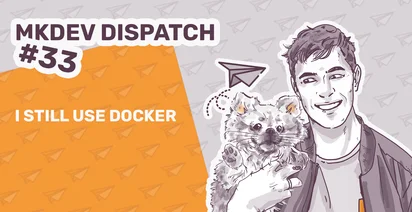I Still Use Docker | ✉️ #33

Hey! 👋
This summer we’ve published my Dockerless course for free on YouTube. The whole one hour and a half exploration of what container standards look like and which tools exist and power our Kubernetes clusters is now available for everyone to watch. So I feel like I have to clarify something: I definitely still use Docker on a daily basis.
For a couple of years, I sticked to Podman and it worked (and keeps working!) just great. Then, once I slowly shifted doing most of my work to Apple Silicon, I’ve started using Docker again. I could run Podman on MacOS, but I don't see any real reason to go this way. In the end, Docker is still great at what made Docker popular in the first place: excellent developer experience. The whole package, with Docker for Desktop, integration with VS Code, and small MacOS-specific tweaks are just too nice to ignore.
And I definitely don’t use Docker in any of the clusters and systems I am working with. Again, I could use Docker there as well, but there are only downsides in doing so. You won’t find Docker in your cloud provider’s managed Kubernetes clusters, and you won’t find it in none-Kubernetes services (like ECS) either. What makes Docker excellent on your laptop, makes it unnecessary on your infra. Best tool for the job in it’s purest form.
And that’s the whole point of Dockerless: to help people to see beyond “Docker”, to learn what OCI and cri-o and other standards are, and stop saying “docker” containers. They are just containers and container images, and I simply love to work with them via Docker on my laptop.
What We've Shared
How to start with Azure OpenAI? A comprehensive introduction to working with advanced AI technologies.
AWS re:Invent 2023 Top Announcements. AWS re:Invent 2023 is over and it's time to look at the most important releases, from Amazon Q and Bedrock, to AI in CloudWatch and slightly ridiculous new Serverless offerings.
'DevOps Accents', episode 25: In this episode of DevOps Accents, Pablo and Leo talk to Dotan Horivits, a developer advocate from logz.io
Meanwhile on the website, all four chapters of the OpenShift/OKD Course are now complete with the addition of the last two of them:
How to Configure OpenShift 4 Cluster Nodes: MachineConfig Operator and CoreOS
OpenShift 4 Troubleshooting: Your Cluster is Broken, What's Next?
What We've Discovered
OpenAI Agreed to Buy $51 Million of AI Chips From a Startup Backed by CEO Sam Altman: Sam Altman's involvement in a $51 million intent-to-purchase agreement with Rain AI, a startup developing brain-like NPUs, reflecting OpenAI's interest in advanced AI hardware amid high costs and supply challenges.
Argo Workflows - Proven Patterns from Production: Good tips on running Argo Workflows in production, from garbage collection to some useful patterns.
EC2 Capacity Blocks: You can now reserve in advance P5 instances, with clusters of up to 512 GPUs, in case you need to train some huge models and have deep pockets.
How to upgrade Amazon EKS worker nodes with Karpenter Drift: New Karpenter feature allows detecting drift between your nodes and node template, which, in return, allows to neatly automate node upgrades via an AMI selector. Nice!
Kubernetes Gateway API is GA: Looking forward to replacing Ingress with those new CRDs.
A random reminder
Guests on our podcast now include Darko Fabijan from Semaphore, Marcello De Polli from BetterDoc and Dotan Horivits from logz.io. If you were hesitating to check out DevOps Accents before, give it a try!
The 34th mkdev dispatch will arrive on Friday, December 22nd. See you next time!
